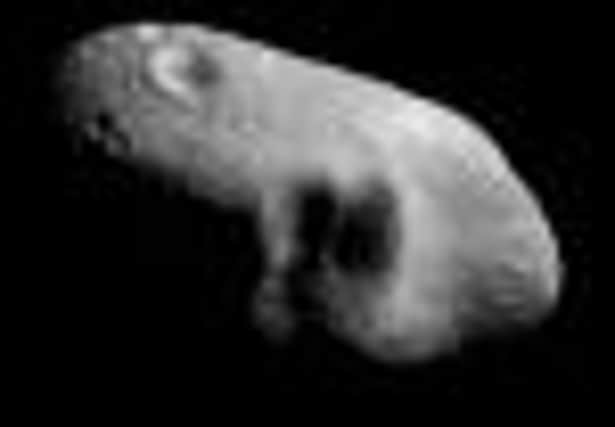There’s gold in them thar asteroids


Titanic and Avatar director James Cameron, Google executive chairman Eric Schmidt and space tourism pioneer Peter Diamandis have announced a bid to tap into the mineral wealth of asteroids circling Earth.
The men behind the multi-million pound Planetary Resources Inc say their plans could transform the world and “drastically reduce the cost of deep space exploration”.
Advertisement
Hide AdAdvertisement
Hide AdMr Cameron, who recently took a one-man submarine to the bottom of the Pacific Ocean, is an investor in the venture which he says could “transform humanity’s prosperity”.
Mr Diamandis told a news conference at the Museum of Flight in Seattle: “Since my early teenage years, I’ve wanted to be an asteroid miner. I always viewed it as a glamorous vision of where we could go.
“Many of the scarce metals and minerals on Earth are in near-infinite quantities in space. As access to these materials increases, not only will the cost of everything from microelectronics to energy storage be reduced, but new applications will result in important applications,”
The company plans to develop technology to explore Near Earth Asteroids, or NEAs, in search of precious metals and water – which could make long-distance space travel a reality.
As well as providing astronauts with a source of drinking water, scientists also believe the hydrogen and oxygen in water could be used as a raw material for rocket fuel.
Company co-founder Eric Anderson said: “Water is perhaps the most valuable resource in space. Accessing a water-rich asteroid will greatly enable the large-scale exploration of the solar system. Water will also be separated into oxygen and hydrogen for breathable air and rocket propellant,”
He said the company had been fortunate to attract investors passionate about space exploration, and added the project had already captured the imagination of people around the world.
“We see the future of Earth as a Garden of Eden where we will do all our heavy mining in space,” he said.
Advertisement
Hide AdAdvertisement
Hide AdOf approximately 9,000 NEAs about 1,500 are as accessible as the Moon.
The first stage of the project in the next 18 to 24 months will see a series of telescopes designed to seek out suitable targets for exploration. The second phase will see a swarm of explorer spacecraft, called the Arkyd range, which will investigate the asteroids.
In the longer term, robotic ships will be developed which will be able to extract the mineral wealth contained in asteroids circling the earth.
Under the banner “The great adventure of the 21st Century”, the company launched yesterday with a press conference broadcast live on the internet.
President and chief engineer, Chris Lewicki, said Planetary Resources would be attempting to drastically reduce the cost of space exploration.
He said: “Our project will allow the rapid development of commercial interplanetary space exploration.
“Our mission is not only to expand the world’s resource base, but we want to increase people’s access to, and understanding of, our planet and solar system by developing capable and cost-efficient systems.”
Investors in the company, who include some of the biggest names in internet technology, believe space could be the next big frontier for prospectors, comparing it both to the early days of the internet and to the California gold rush of the 1840s.
Advertisement
Hide AdAdvertisement
Hide AdMr Schmidt said: “The pursuit of resources drove the discovery of America and opened the West. The same drivers still hold true for opening the space frontier. Expanding the resource base for humanity is important for our future.”
Google board member and Planetary Resources investor K Ram Shriram said: “I see the same potential in Planetary Resources as I did in the early days of Google.”
However some experts doubt the company will be able to fulfil its dreams. Purdue University planetary geologist Jay Melosh said space exploration was “a sport that only wealthy nations, and those wishing to demonstrate their technical prowess, can afford to indulge”.
But former Nasa astronaut Thomas Jones, an adviser to the company, said: “It is the stuff of science fiction, but like in so many other areas of science fiction, it’s possible to begin the process of making them reality.”